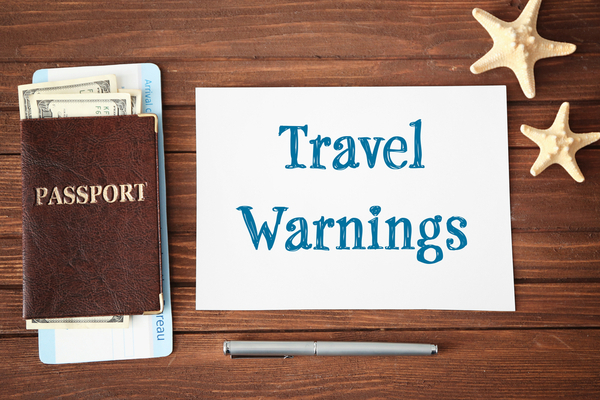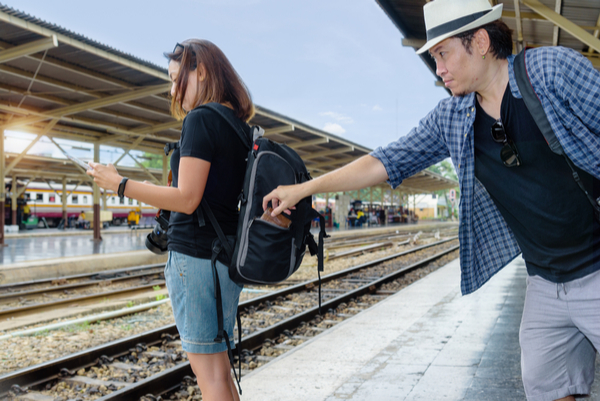The Best Ways to Stay Safe and Prevent Theft While Traveling
By Lloyd C | Updated November 14th, 2011

So you’ve got your credit card, passport, foreign currency, and camera tucked into a fully laden backpack and you’ll be picking up sunscreen and any last minute forgets on your way to the airport. What else do you need? How about any anti-theft devices you might have gathering dust in the house?
No one wants to think that the part of the world they’re planning to visit and travel across harbors dangers and unscrupulous people eager to rip them off at every corner, but rather that they’re heading for an undiscovered paradise on the wild adventure of a lifetime.
Do Your Research About The Place You Are Going
However, it does no harm to leave for your destination as prepared as you can be and, when there, to take the precautions required to ensure that your adventure holiday or trip around the world isn’t marred by any unfortunate incidents where your belongings and personal possessions are concerned.

Just the other week we wrote an in-depth feature piece that helps travelers recover from losing travel documents and other essential belongings and what to do when left stranded overseas.
Sadly though some travelers will succumb to the perils of crime while abroad on their trip and theft is one such crime that can bring a fantastic trip to a screeching grinding halt. Here are our Globetrooper recommendations on how to avoid being another crime statistic.
Read the Travel Advisories From Your Embassy or Consulate

Because few tourist organizations issue safety advice for fear it may scare off potential visitors, it can be difficult to find such information about the spot you’re traveling to.
Obviously, certain countries stand out as no-go destinations, they will be familiar already and these are probably the places that are making the news right now.
Troubles that afflict other countries or regions within countries may not be as apparent.
Most countries release regular travel advisories on their websites, in the United Kingdom, for example, a traveler may check the latest travel recommendations at the Foreign Office.
Employ Common Sense and Practical Thinking

However, in most cases, you can use your common sense. If you look conspicuous and very much like a tourist, you are not only signaling that you are probably carrying a large amount of cash, but also that you’re perhaps feeling a little vulnerable and lost in a city many miles from home.
These are green lights to a thief. Most people think that carrying a camera around identifies them as a tourist, but in some cities what you wear and where you wear it is just as strong an indicator.
Theft is not always blatant robbery either, predators can just as easily take advantage of unfamiliarity with customs and local currency to make a quick payday at your expense. Learn quickly just how much it should cost for a taxi or a souvenir.
Try Not to Stand Out

For example, anyone wearing shorts on the Barcelona metro or in the city center will stand out as a tourist (the people of Barcelona are almost obsessive about how they dress!)
That doesn’t mean you have to take a suitcase full of designer gear, just that making a few modifications to what you wear and when, as well as to how you act on your trip, could very well reduce your risk of becoming a victim of theft.
Almost every city has its unsavory parts and a little research will help you to identify these. While you may be one of those tourists who feels that he or she hasn’t truly experienced all a city has to offer unless it involves sampling the areas that the guidebooks recommend steering clear of, try to do so with someone who knows the region and can advise on how to behave to protect your safety.
If you must venture away from the tourist track then go in a group or with local people that you are comfortable with.
Alternatively, sign up for a guided tour of the areas (if available) so that you get to see them in safer conditions.
Keep Your Belongings Close at All Times

Always look after your belongings. Wear them as close to your body as you can. A backpack or messenger-type bag that’s worn across the body is a more secure place for your belongings than a purse that hangs from one shoulder.
Similarly, don’t unnecessarily expose your camera, iPod, or cell phone, or leave them unattended. You may think that your cell phone is safe resting on a table some inches away from your hand, but a clever con artist will find it easy to distract you for the seconds it takes for him to steal it.
Reduce Travel Crime With These Essential Tips
The following tips will help keep you and your belongings safe during your travels:
• Act confidently and with a sense of purpose. Thieves are less likely to prey on a tourist who looks in control of a situation.
• Be wary of groups of people who approach you or try to attract your attention. Con artists usually work in groups – one or two distract you while the others steal your belongings.
• When wearing a backpack, make sure that no valuables are in the outer pockets, especially if you plan to wear it while traveling on public transport.
A thief could easily gain access to your belongings if they’re in an outer section of your pack while you remain completely oblivious.
• Keep valuables out of sight. Don’t carry them in such a way as to make it easy for a thief to snatch them from you (i.e. don’t carry a camera suspended by a strap around your neck).
• If you need to consult a map, do so discreetly – in a café or side street.
• When in cafes, bars, or restaurants remain vigilant. It’s easy to switch off when you’re relaxing, but don’t leave any belongings on the floor or where you can’t see them at all times.
Don’t hang your purse on the arm of a chair. It’s a good idea to wrap the strap of your purse or bag around something that will act as an “alert system” should someone try to take it (e.g. your leg!).
• Carry only as much cash as you need. If your hotel room has a safe then use it.
• When removing your wallet from your bag, do so discreetly, especially in areas where thieves are likely to operate (e.g. train stations, tourist attraction sites).
The Globetrooper View on Preventing Travel Crime
If a thief or opportunist knows where you keep your wallet and valuables he is more inclined to believe he can steal it from you and more likely to attempt to do so.
Even if you feel relaxed and comfortable always remembers that you are not at home and your surrounding and the people around you may not be quite what they seem.
A few sensible measures will ensure that you come home having experienced the adventure trip of a lifetime and for all the right reasons.
